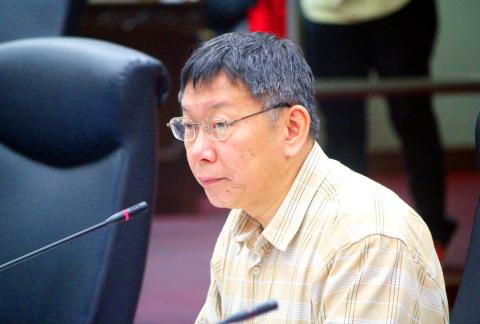If Beijing does not order the release of human rights advocate Lee Ming-che (李明哲), “problems will arise” when the Chinese delegation arrives in Taipei for the Summer Universiade in August, Taipei Mayor Ko Wen-je (柯文哲) said.
China’s handling of the Lee incident is “strange” and “runs counter to global norms,” Ko said in an interview published yesterday by the Chinese-language Liberty Times (the Taipei Times’ sister newspaper).
Ko said he had no preconceived notions about Lee’s arrest almost three weeks ago, but Beijing should have disclosed on what grounds it detained him and allowed his family to visit on the second or third day of his detention.

Photo: CNA
“This is the way of civilized nations,” he said, adding that he was concerned about China, as a superpower, demonstrating behavior that is at odds with the civilized world.
China’s handling of the Lee case provided insight into why, despite all the benefits that China’s Taiwan Affairs Office has offered Taiwanese businesspeople in China, there is still a general antipathy toward China among Taiwanese, Ko said.
“It is very simple. The Chou Tzu-yu (周子瑜) incident probably scared off half of Taiwanese, while the Lee Ming-che incident scared off the other half,” Ko said, refering to a seemingly forced apology by the Taiwanese K-pop idol after she displayed a Republic of China flag on a South Korean TV show last year.
“Maybe they do not find it unusual, but to Taiwanese it was beyond shock and awe,” Ko said, adding that the two incidents showed a fundamental difference between Taiwanese and Chinese beliefs, which is an issue Beijing should be mindful of.
As China plans to send a delegation of at least 700 to Taipei to compete in the Summer Universiade, problems will arise if Beijing does not handle the Lee incident with caution, Ko said.
Ko said that although Taipei’s extensive experience with dealing with protesters is enough to guarantee the safety of Chinese delegates, he cannot control public sentiments toward the delegation.
“Who do you think spectators will root for if China and US went head-to-head in a match?” he asked.
Taiwanese attitudes toward the Chinese delegation would have a profound political effect on Beijing and the world through live broadcast of the Games, he said.
Asked what messages he would convey to Chinese President Xi Jinping (習近平) if he meets Xi’s aides on his trip to China for the Taipei-Shanghai Forum in June, Ko said that it is unclear whether he would meet with them.
If he has a chance to meet with Beijing officials, he would urge China to respect “universal values and global norms” in addition to promoting exchanges across the Taiwan Strait, so that disagreements can be resolved by an increase in goodwill, Ko said.

INVESTIGATION: The case is the latest instance of a DPP figure being implicated in an espionage network accused of allegedly leaking information to Chinese intelligence Democratic Progressive Party (DPP) member Ho Jen-chieh (何仁傑) was detained and held incommunicado yesterday on suspicion of spying for China during his tenure as assistant to then-minister of foreign affairs Joseph Wu (吳釗燮). The Taipei District Prosecutors’ Office said Ho was implicated during its investigation into alleged spying activities by former Presidential Office consultant Wu Shang-yu (吳尚雨). Prosecutors said there is reason to believe Ho breached the National Security Act (國家安全法) by leaking classified Ministry of Foreign Affairs information to Chinese intelligence. Following interrogation, prosecutors petitioned the Taipei District Court to detain Ho, citing concerns over potential collusion or tampering of evidence. The

‘FORM OF PROTEST’: The German Institute Taipei said it was ‘shocked’ to see Nazi symbolism used in connection with political aims as it condemned the incident Sung Chien-liang (宋建樑), who led efforts to recall Democratic Progressive Party (DPP) Legislator Lee Kun-cheng (李坤城), was released on bail of NT$80,000 yesterday amid an outcry over a Nazi armband he wore to questioning the night before. Sung arrived at the New Taipei City District Prosecutors’ Office for questioning in a recall petition forgery case on Tuesday night wearing a red armband bearing a swastika, carrying a copy of Adolf Hitler’s Mein Kampf and giving a Nazi salute. Sung left the building at 1:15am without the armband and apparently covering the book with a coat. This is a serious international scandal and Chinese

Seventy percent of middle and elementary schools now conduct English classes entirely in English, the Ministry of Education said, as it encourages schools nationwide to adopt this practice Minister of Education (MOE) Cheng Ying-yao (鄭英耀) is scheduled to present a report on the government’s bilingual education policy to the Legislative Yuan’s Education and Culture Committee today. The report would outline strategies aimed at expanding access to education, reducing regional disparities and improving talent cultivation. Implementation of bilingual education policies has varied across local governments, occasionally drawing public criticism. For example, some schools have required teachers of non-English subjects to pass English proficiency

TRADE: The premier pledged safeguards on ‘Made in Taiwan’ labeling, anti-dumping measures and stricter export controls to strengthen its position in trade talks Products labeled “made in Taiwan” must be genuinely made in Taiwan, Premier Cho Jung-tai (卓榮泰) said yesterday, vowing to enforce strict safeguards against “origin laundering” and initiate anti-dumping investigations to prevent China dumping its products in Taiwan. Cho made the remarks in a discussion session with representatives from industries in Kaohsiung. In response to the US government’s recent announcement of “reciprocal” tariffs on its trading partners, President William Lai (賴清德) and Cho last week began a series of consultations with industry leaders nationwide to gather feedback and address concerns. Taiwanese and US officials held a videoconference on Friday evening to discuss the